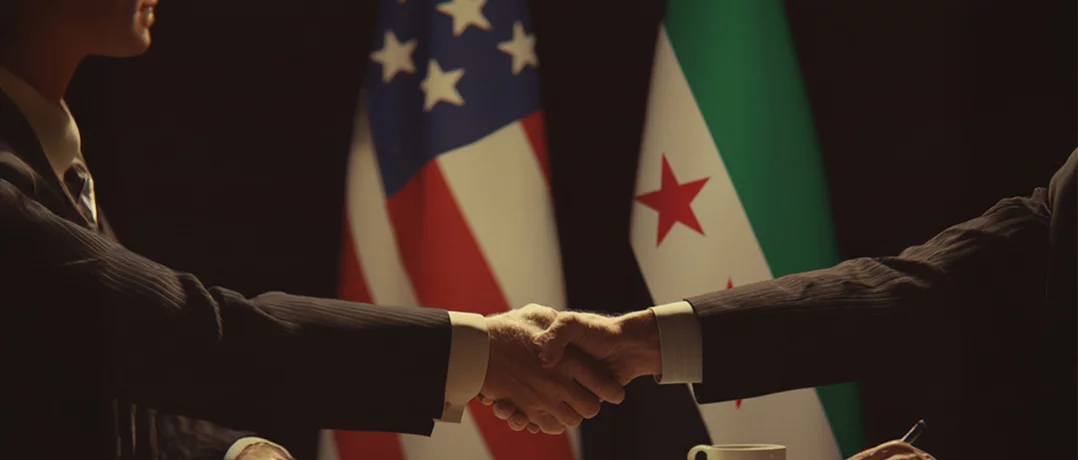Israeli Syrian relations: Syria seeks US support to revive stalled peace talks with Israel.
US-Syrian strategic partnership set to solidify
US-Syrian strategic partnership set to solidify


The rapprochement between the United States and Syria appears yet from being over. Once a wanted terrorist with a $10 million US bounty on his head, Syrian interim President Ahmed al-Sharaa (formerly known by his nom de guerre as “Abu Muhammad al-Golani”) is set to visit Washington early this month, becoming the first Syrian president to enter the White House since the country’s independence in 1946.
While aiming to maintain “an equal distance with all countries and build relations based on cooperation and openness,” Syrian Foreign Minister Asaad al-Shaibani claimed that his country is seeking to build a “very strong strategic partnership” with the United States.
From here, 3 vital issues will surely be addressed during the anticipated meeting.
From terrorism to counterterrorism efforts
No one would have expected what is taking place today. Al-Sharaa, once a designated terrorist, is allegedly set to sign a document during his meeting with Trump for Damascus to join the US-led international coalition against ISIS. This was revealed on the sidelines of the Manama Dialogue in Bahrain on November 1, 2025, during which US Special Envoy to Syria Tom Barrack hinted of its possibility.
Should this signing occur, it would mark a significant shift not only in al-Sharaa’s Hay’at Tahir al-Sham (HTS), but rather Syria’s historical position during the Assad regime. The move would redefine the country’s position from being designated as a State Sponsors of Terrorism (SST) to becoming an actual reliable partner in combating this international crime. Although doubts emerge regarding al-Sharaa or HTS sincere intents, the group has nevertheless fought viciously against ISIS and distanced itself from al-Qaeda ever since its split from the two. As Damascus hopes to consolidate its power and foreign backing, it will definitely seek to crackdown on extremism and terrorism.
This task would entail the presence of a formidable and capable Syrian armed forces. After the fall of the Assad regime, however, Israel has destroyed most of Damascus’ military capabilities. As the country aims to rebuild its army, the US could potentially play a vital role. Its supply of the necessary equipment to carry out the aforementioned objective remains key, especially as it takes into consideration Israel’s Qualitative Military Edge (QME), which would not be the case if Syria were to receive assistance from alternative competitive sources (such as Russia).
Sanctions relief and reconstruction appeal
Another critical issue is that of sanctions and reconstruction. After a brutal 14-year civil war, the country is devastated and in ruins. Reconstructing what had been decimated thus becomes a necessity, not only for humanitarian purposes but also for the survival of the new interim authorities. Relieving the country from the Assad regime is one thing, however providing an
efficient alternative is completely another. Its experience in governing Idlib has proved the need to address people’s concerns, needs and security. It is from this fact that HTS established the Salvation Government and aimed to consolidate its rule in the province, as a means to offer the people a viable alternative to the regime.
On October 21, 2025, the World Bank announced that Syria’s postwar reconstruction costs are estimated at around $216 billion. This reveals the sheer scale of the investments and economic aid needed to restore what had been lost. Therefore, al-Sharaa will likely raise this issue during his visit to Washington. Meanwhile, he will also most likely be addressing the sanctions matter, hoping to achieve their full lifting to allow for the easy and unrestricted money flow into the country.
Israeli-Syrian relations on the table
Lastly, the issue of the Israeli-Syrian relations will definitely be raised in Washington. The two have embarked on promising and unprecedented direct negotiations earlier this year, signaling hopes for a potential peace agreement that would end decades of enmity. However, talks have been stalled recently due to disagreement on contentious issues (especially the Golan Heights) and Damascus’ close relationship with Ankara.
Since the US carries significant leverage of Tel Aviv (given its generous military, economic and diplomatic assistance), Damascus could turn to Washington to revive and advance these talks, even pressuring Israel to ease it demands and activities in Syria’s occupied territories.


